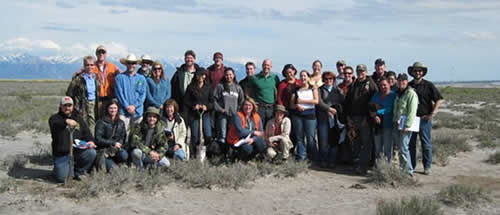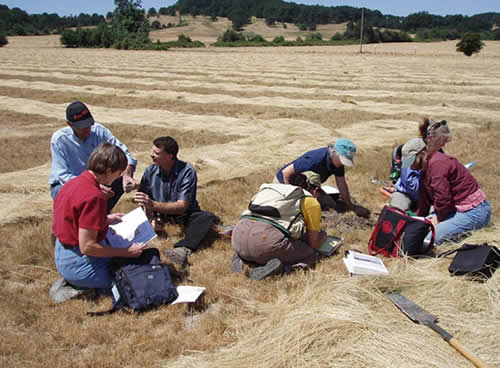

 |
|
 |
|
 |
|
|
|
|
 |
|
 |
Training
Regulatory IV: Wetland Delineation
WRTC staff provides instruction for the wetland delineation course organized through
the USACE PROSPECT system.
Regulatory IV presents an interagency course in wetland delineation based on the
current Federal Wetland delineation manual. The course provides student participants
with a basic understanding of the interaction of vegetation, soils, and hydrology in
wetlands in sufficient detail to apply delineation methods on routine cases. Upon
completion, successful graduates possess the background necessary for identifying
wetlands and determining their boundaries for purposes of administering programs such
as the Section 404 Regulatory Program. Successful completion is determined by attendance
and participation in all lecture, field, and laboratory sessions. Topics include
(a) wetland characteristics including soils, hydrology, and vegetation; (b) wetland
delineation methods; and (c) field exercises in recognition of wetland boundaries.

Regulatory V: Wetland assessment
WRTC staff provides instruction for the wetland assessment course organized through
the USACE PROSPECT system.
Regulatory V presents an interagency course designed for employees of federal agencies
involved in assessing wetland functions in the field. The course ensures students are
proficient in applying regional wetland assessment procedures and evaluating their results.
The course focuses on the application of assessments under different scenarios such
as project impact determination, alternative analysis, and mitigation design/monitoring
associated with implementation of regulatory programs such as the Clean Water Act
and the Food Securities Act. Successful completion of the course is determined by
attendance and participation in all lecture, field, and laboratory sessions. Topics
include overview of the Hydrogeomorphic Approach; developing assessments; verifying,
validating, and testing assessment methods. After completing the course, students
should will understand wetland assessments, how assessments are developed and applied,
and the importance of wetland assessment to natural resource management.
Fundamentals of wetland ecology
WRTC staff provides instruction for the fundamentals of wetland ecology course organized
through the USACE PROSPECT system. Students
are provided with state-of-the-art basic knowledge of wetland flora and fauna, hydrology,
soils, and ecology. The course emphasizes wetlands functions and values in an ecosystem
perspective. Both saltwater and freshwater wetlands will be addressed in the course.
The relationship of wetlands to adjacent terrestrial and deep water habitats, along
with wetlands succession and dynamics, are discussed. This course provides the base
working level fundamentals in the wetlands ecology area and may also serve to update
students in current developments in wetlands science. While the focus of this course
is not on wetlands delineation or regulatory (Section 404) issues, regulatory personnel
would benefit from the broader overview of wetlands ecology. This course provides
instruction in the following topics:
(a) wetland hydrology;
(b) wetland vegetation;
(c) major faunal populations associated with wetlands;
(d) wetland plant and animal communities, ecosystem relationships, and dynamic processes;
(e) hydric soils;
(f) wetland classification systems, including the relationship of such wetland classifications
to ecosystems classifications and parameters;
(g) principles of wetlands ecology and dynamics;
(h) current research in wetlands;
(i) evaluation of wetland functions;
(j) overview of wetland development, restoration, and constructed wetlands; and
(k) open discussion and problem solving.
Wetland delineation refresher cources
Providing wetland-delineation training for federal agency regulatory personnel remains
essential due to: (1) the development and implementation of new regional supplements
to the wetland-delineation manual, (2) increasing numbers of retirements among experienced
wetland delineators, and (3) continuing rapid turnover of agency personnel. Wetland
delineation refresher sessions led by WRTC staff are designed for personnel who
have taken the introductory Regulatory IV wetland-delineation class in the past
but need to keep abreast of new developments, materials, and guidance. Training
sessions rotate among USACE Districts, reducing the costs of travel and minimizing
the disruption of ongoing workloads. Each session focuses on the proper application
of new regional supplements and addresses only those indicators and guidance appropriate
to the location where the session is held. Refresher courses are not intended to
take the place of more intensive, field-oriented courses in wetland delineation
(e.g., Regulatory IV), hydric soils, or other topics.
Basic hydric soils for wetland delineation
WRTC staff leads an intensive three day training session for field-orientated individuals
directly involved with wetland identification and delineation, but lack a strong
soils background or require a review of hydric soils. The instructor focuses on
the participantís technical field issues and problems. The course covers basic hydric
soil description and delineation, implementation of the regional supplement, and
demonstrates the use of hydric soils indicators for delineation. Also, altered and
problem soil situations are addressed. Each day consists of classroom instruction
and field demonstrations, therefore, participants should expect to encounter wet
field conditions and plan for appropriate field clothing (rain gear, boots, etc.).
All participants will receive a number of learning materials and delineation tools
as well as a certificate of completion.

Advanced wetland delineation
WRTC staff lead an advanced wetland delineation course designed for experienced
regulatory personnel who have taken the introductory Regulatory IV wetland delineation
class and display technical expertise within their region. T Each session focuses
on the proper application of regional supplements, emphasizing approaches to difficult
wetland delineations. The advanced course is not intended to take the place of basic
courses in wetland delineation. Difficult wetland delineations account for between
25 and 50% of wetland delineations occurring across the nation and include areas
exposed to fill material, complex wetland/upland mosaics, recently created wetlands,
managed plant communities, and mitigation wetlands. Additionally, naturally problematic
wetlands occur in all regions, associated with FACU dominated plant communities,
soil parent materials, seasonal hydrology, and other issues posing challenges to
regulatory staff. The advanced delineation course introduces participants to technological
approaches to wetland delineation including water table monitoring/modeling, soil
redox probes, and other techniques.